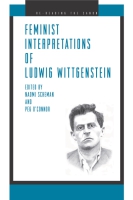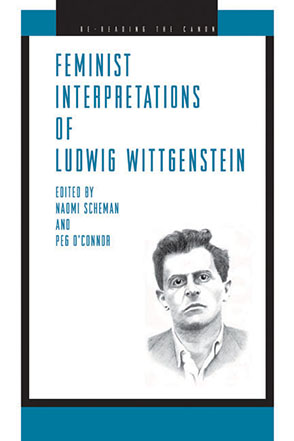Feminist Interpretations of Ludwig Wittgenstein
Edited by Naomi Scheman and Peg O’Connor
“Not only is there a diversity of interpretation of Wittgenstein vis-à-vis feminist theory, but there is great variation in these essays’ incorporation of Wittgenstein’s philosophical constructs as well. . . . Scholars in either field will find this of interest.”
- Description
- Reviews
- Bio
- Subjects
Wittgenstein and feminist theorists are alike, however, in being unwilling or unable to "make sense" in the terms of the traditions from which they come, needing to rely on other means—including telling stories about everyday life—to change our ideas of what sense is and of what it is to make it. For both, appeal to grounding is problematic, but the presumed groundedness of particular judgments remains an unavoidable feature of discourse and, as such, in need of understanding. For feminist theory, Wittgenstein suggests responses to the immobilizing tugs between modernist modes of theorizing and postmodern challenges to them. For Wittgenstein, feminist theory suggests responses to those who would turn him into the "normal" philosopher he dreaded becoming, one who offers perhaps unorthodox solutions to recognizable philosophical problems.
In addition to an introductory essay by Naomi Scheman, the volume’s twenty chapters are grouped in sections titled "The Subject of Philosophy and the Philosophical Subject," "Wittgensteinian Feminist Philosophy: Contrasting Visions," "Drawing Boundaries: Categories and Kinds," "Being Human: Agents and Subjects," and "Feminism’s Allies: New Players, New Games." These essays give us ways of understanding Wittgenstein and feminist theory that make the alliance a mutually fruitful one, even as they bring to their readings of Wittgenstein an explicitly historical and political perspective that is, at best, implicit in his work. The recent salutary turn in (analytic) philosophy toward taking history seriously has shown how the apparently timeless problems of supposedly generic subjects arose out of historically specific circumstances. These essays shed light on the task of feminist theorists—along with postcolonial, queer, and critical race theorists—to (in Wittgenstein’s words) "rotate the axis of our examination" around whatever "real need[s]" might emerge through the struggles of modernity’s Others.
Contributors (besides the editors) are Nancy E. Baker, Nalini Bhushan, Jane Braaten, Judith Bradford, Sandra W. Churchill, Daniel Cohen, Tim Craker, Alice Crary, Susan Hekman, Cressida J. Heyes, Sarah Lucia Hoagland, Christine M. Koggel, Bruce Krajewski, Wendy Lynne Lee, Hilda Lindemann Nelson, Deborah Orr, Rupert Read, Phyllis Rooney, and Janet Farrell Smith.
“Not only is there a diversity of interpretation of Wittgenstein vis-à-vis feminist theory, but there is great variation in these essays’ incorporation of Wittgenstein’s philosophical constructs as well. . . . Scholars in either field will find this of interest.”
“As should be clear, this book is not really something that is designed for those whose primary interest is Wittgenstein. But for those with an interest in feminist theory and an openness to Wittgensteinian ideas, it makes many valuable contributions.”
“For feminist philosophers interested in the history of ideas, the release of a new volume in The Pennsylvania State University Press ‘Re-Reading The Canon’ series is an important event. This volume fully lives up to the series’ well-earned reputation for excellence. It provides a wealth of insight and stimulation for those interested in the implications of Wittgenstein’s work for destabilizing philosophical orthodoxes as well as for those who are concerned more specifically with questions of gender.”
“This volume fully lives up to the series’ well-earned reputation for excellence. It provides a wealth of insight and stimulation for those interested in the implications of Wittgenstein’s work for destabilizing philosophical orthodoxies as well as for those who are concerned more specifically with questions of gender.”
Naomi Scheman is Professor of Philosophy and Women's Studies and Associate Dean of the Graduate School at the University of Minnesota. Peg O'Connor is Director of the Women's Studies Program at Gustavus Adolphus College.
Mailing List
Subscribe to our mailing list and be notified about new titles, journals and catalogs.




